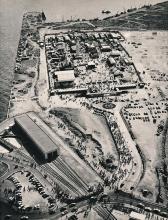The Bronze Lions
Primary tabs
Submitted by Andrew Suddaby on Wed, 2019-08-14 22:24
Can anyone provide an answer to a question that has puzzled me over many years? The shrapnel damage on the two bronze lions outside the Hong Kong and Shanghai Bank in Central is only on their relatively protected sides closest to the bank. Why, if we can reasonably assume that the lions would always have been positioned facing away from the bank, as they are today, is there no shaprnel damage on the side facing the harbour and Tsim Sha Tsui from where shells would have been fired during December 1941?
Am I missing something? Andrew Suddaby
Forum:


The Bronze Lions
What if the 2 lions were simply interchanged with each other so that the outside became the inside? It's just a guess.
I wondered about that but, if
I wondered about that but, if I remember correctly, that would mean the lions' heads would be facing inwards towards the door and that would not seem to be logical if they were placed to protect the bank. We'd need to check whether the heads are looking straight ahead or to one side. I have just looked at Google Images and the lions are facing slightly outwards so I don't think that they would have been switched.
Re: Bronze Lions
The shrapnel damage is given a mention here The recovery of the bronze lion statues and those of Queen Victoria etc. can be viewed here
Difficult to ascertain but the shrapnel damage may have occurred in Japan.
The Bronze Lions
Thanks Moddsey,
Yes, damage in Japan is a possibility but the damage is consistent with the two lions standing as a pair and I believe that I once read that their fate in Japan, as with the Queen Victoria statue, was not so exalted. Andrew
re: The Bronze Lions
Andrew, that's a good question - hadn't thought of that before!
Here's a 1941 photo that shows they were both looking out to the road as they are now:
You might want to write to the HSBC archives (https://www.hsbc.com/who-we-are/our-history/archives) to see what information they've gathered about the damage to the lions.
Regards, David
It has not been possible to
It has not been possible to determine exactly when or how the shrapnel damage to the two lions occurred, so perhaps it is best to just let them remain unchallenged as proud and permanent survivors of the battle. The Sphynx in Egypt might be inscrutable, but Stephen and Stit bear their wounds with dignity and honour.
Shrapnel Damage in Central
Tony Banham's book "Not the Slightest Chance" gives a mention of evidence of shrapnel damage in Central as revealed here
Thanks Moddsey. It's a while
Thanks Moddsey. It's a while since I last read Tony's excellent book so I'd better do so again in case there are answers to all sorts of questions that have puzzled me!
Shrapnel damage - HSBC Lions - T. Banham's book
Could you please mention which page of the book the damage to the lions is mentioned on?
Notes to Pages
Don't have the book in front of me at this juncture but note 45 refers to Pages 89-95.
The Bronze Lions
The lions stephen and Stitt this is an extract from HSBC booklet
Regards
PaulO
Turbulent Times
The first was during the Japanese occupation of Hong Kong when the lions were removed and consigned to Japan as scrap metal. The bank was unaware of their wherabouts until they were spotted in a Japanese naval dock by a sharp-eyed American sailor. He had never been to Hong Kong but had noticed the two lions outside the Shanghai office of the bank in a previous posting. He got word to HSBC of the fate of the lions, and the bank set about the task of organising their rescue. Bringing the lions home to Hong Kong was not an easy task - they were eventually shipped back under an order from General MacArthur, Supreme Commander of the occupying forces in Japan. They were restored to their original position outside the bank in October 1946 with Stephen the roaring lion sitting on the left and Stitt the quiet lion on the right. Both lions had sustained ‘injuries’ from shrapnel damage, which they still bear today, but their return was greeted with great interest.
HSBC Lions
Thanks Moddsey.
"Now sea lions" - later proved untrue